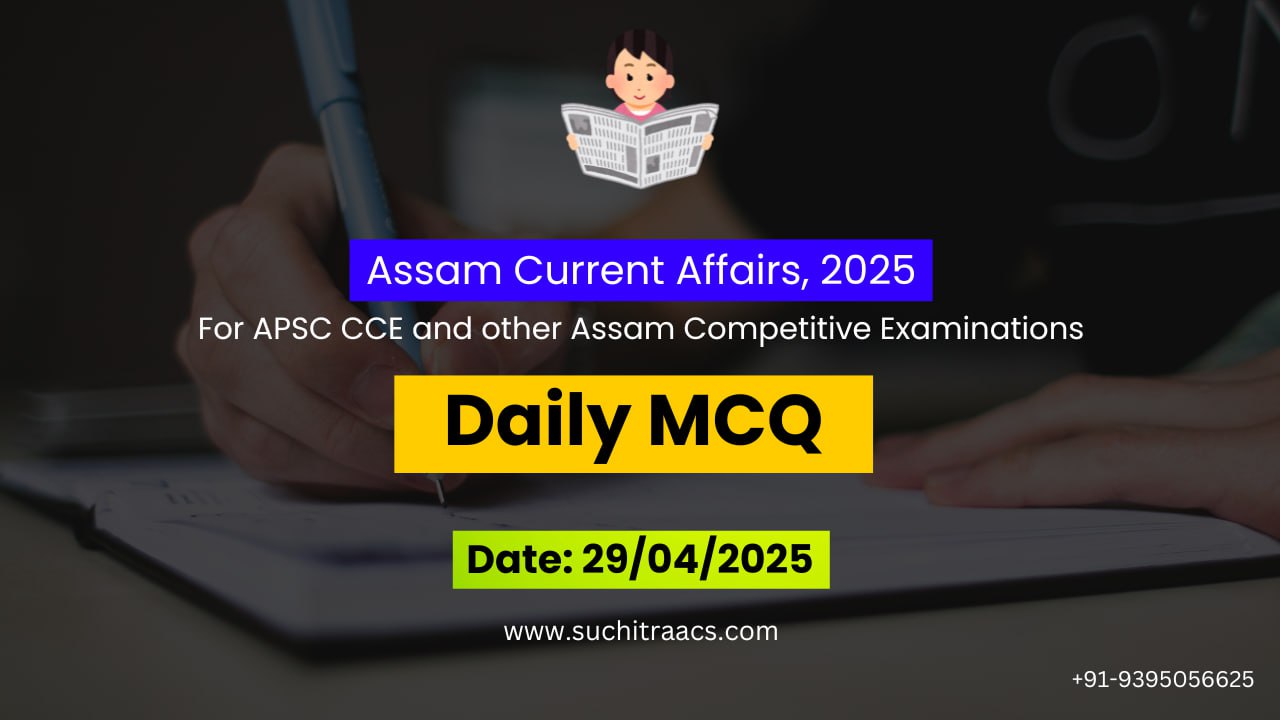APSC MCQs / APSC Prelims Practice Questions based on Assam Tribune (Daily) – 29/04/2025
For APSC CCE and other Assam Competitive examinations aspirants, practicing Daily MCQs is vital. This blog covers most important Prelims questions from the Assam Tribune today (29-4-2025). These issues are key for both APSC Prelims syllabus, offering insights into the important topics of current affairs.
✨ Current Affairs Crash Course for the APSC Prelims 2025

APSC MCQs / APSC Prelims Practice Questions (Date: 29/04/2025)
🌧️ Topic 1: Urban Flooding in Guwahati
Q1. Which of the following are commonly cited causes of urban flooding in Indian cities like Guwahati?
- Encroachment on natural drainage systems
- Inadequate stormwater drainage infrastructure
- Unregulated groundwater extraction
- Loss of wetland ecosystems
A. 1, 2 and 4 only
B. 1 and 3 only
C. 2 and 3 only
D. All of the above
✅ Answer: A
🧠 Explanation: Urban flooding is primarily caused by encroachment, poor drainage, and wetland loss. While unregulated groundwater use affects water table levels, it doesn’t directly lead to surface flooding.
Q2. Under which law can a District Collector issue penalties for civic contract failures related to disaster mitigation in India?
A. Environment Protection Act, 1986
B. Disaster Management Act, 2005
C. Epidemic Diseases Act, 1897
D. Indian Penal Code, 1860
✅ Answer: B
🧠 Explanation: The Disaster Management Act, 2005 empowers district authorities to take proactive measures and enforce penalties for negligence in disaster preparedness or response.
🚂 Topic 2: Drone Cleaning at Kamakhya Station
Q3. The Drone Rules, 2021 in India are regulated by:
A. Ministry of Railways
B. Ministry of Civil Aviation
C. Ministry of Electronics and IT
D. NITI Aayog
✅ Answer: B
🧠 Explanation: Drone Rules, 2021 fall under the purview of the Ministry of Civil Aviation, which regulates drone use in India for personal, commercial, and government purposes.
Q4. Which of the following are advantages of using drones in public infrastructure maintenance?
- Reduced human risk in hazardous zones
- Improved resource efficiency in cleaning operations
- Monitoring biodiversity in urban lakes
- Replacing train drivers in high-speed rail operations
A. 1, 2 and 3 only
B. 1 and 2 only
C. 1, 2 and 4 only
D. All of the above
✅ Answer: A
🧠 Explanation: Drones help with safety, efficiency, and monitoring, but do not replace train drivers—that’s the role of automation/AI in transport.
🌱 Topic 3: Organic Farming & PKVY
Q5. Paramparagat Krishi Vikas Yojana (PKVY) is aimed at:
A. Mechanizing conventional agriculture
B. Promoting Bt cotton in tribal zones
C. Encouraging organic farming using traditional practices
D. Providing universal crop insurance
✅ Answer: C
🧠 Explanation: PKVY promotes chemical-free, traditional, organic farming practices through cluster-based support.
Q6. Consider the following statements regarding Participatory Guarantee System (PGS-India):
- It is an internationally recognized third-party certification scheme.
- It is a decentralized organic certification system suitable for small farmers.
- It is managed by the Ministry of Environment, Forest and Climate Change.
Which of the statements is/are correct?
A. 1 and 2 only
B. 2 only
C. 2 and 3 only
D. 1, 2 and 3
✅ Answer: B
🧠 Explanation:
- PGS-India is a decentralized certification (not third-party).
- Managed by the Ministry of Agriculture, not MoEFCC.
🛡️ Topic 4: Assam–Arunachal Border Agreement
Q7. Article 131 of the Indian Constitution deals with:
A. Special provisions for Scheduled Tribes
B. Inter-State water disputes
C. Original jurisdiction of the Supreme Court in inter-State disputes
D. Emergency powers of the President
✅ Answer: C
🧠 Explanation: Article 131 provides the Supreme Court original jurisdiction in disputes between states or between a state and the Union.
Q8. The Inner Line Permit (ILP), applicable in Arunachal Pradesh, is issued under:
A. Sixth Schedule
B. Bengal Eastern Frontier Regulation Act, 1873
C. Armed Forces Special Powers Act, 1958
D. Forest Rights Act, 2006
✅ Answer: B
🧠 Explanation: ILP is issued under the Bengal Eastern Frontier Regulation Act, 1873 to regulate entry of non-natives in certain tribal-dominated areas.
 APSC Prelims Crash Course, 2025
APSC Prelims Crash Course, 2025
at most affordable rate in Assam!

🔔 Join Our WhatsApp Study Group!
For exclusive access to premium quality content, including study materials, current affairs, MCQs, and model answers for APSC CCE and other Assam competitive exams.
Click here to join: SuchitraACS Study WhatsApp Group
📚 Want to know more about SuchitraACS’s most affordable courses?
Click here to know more: SuchitraACS Courses for APSC CCE and Assam Competitive Examinations




